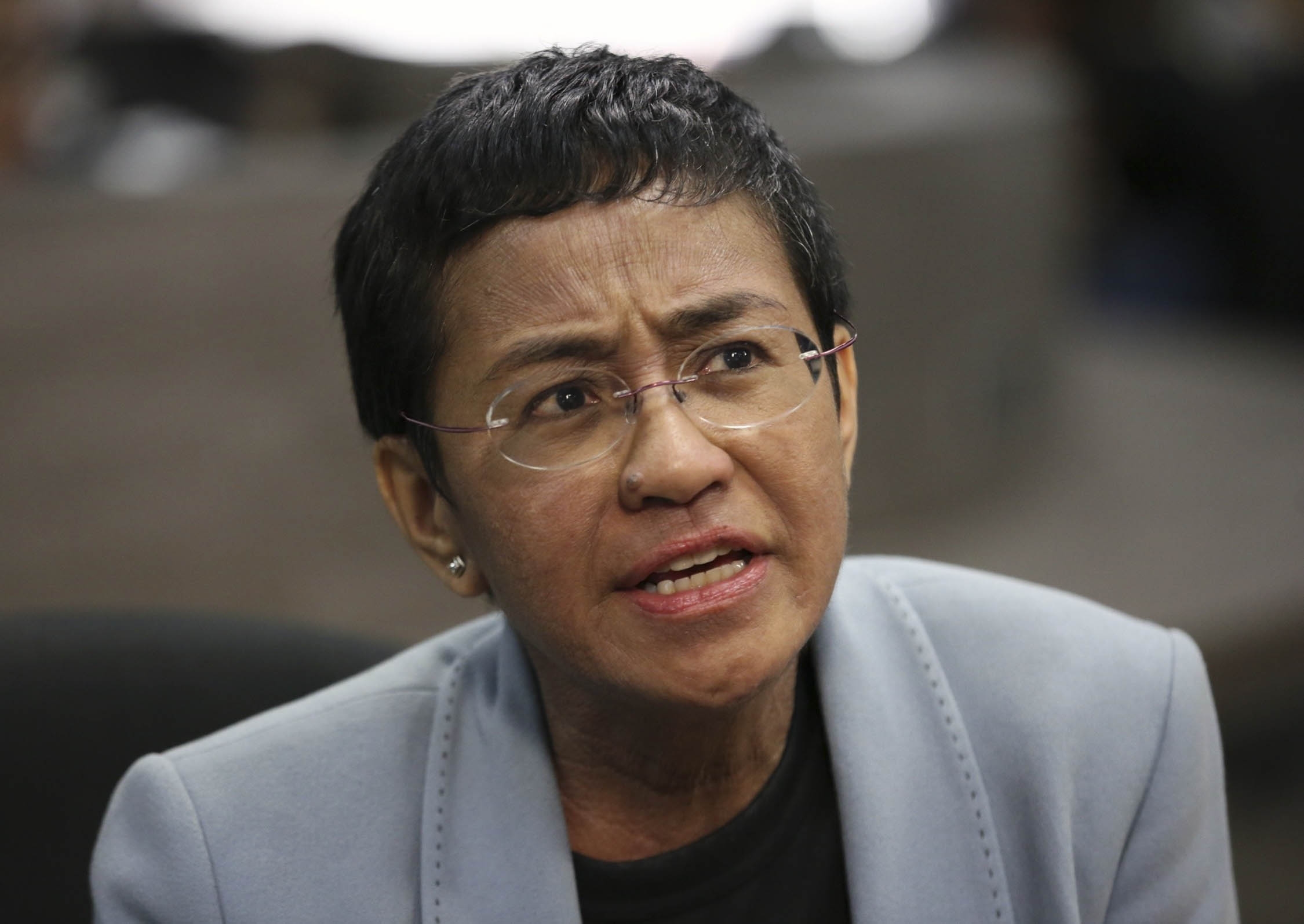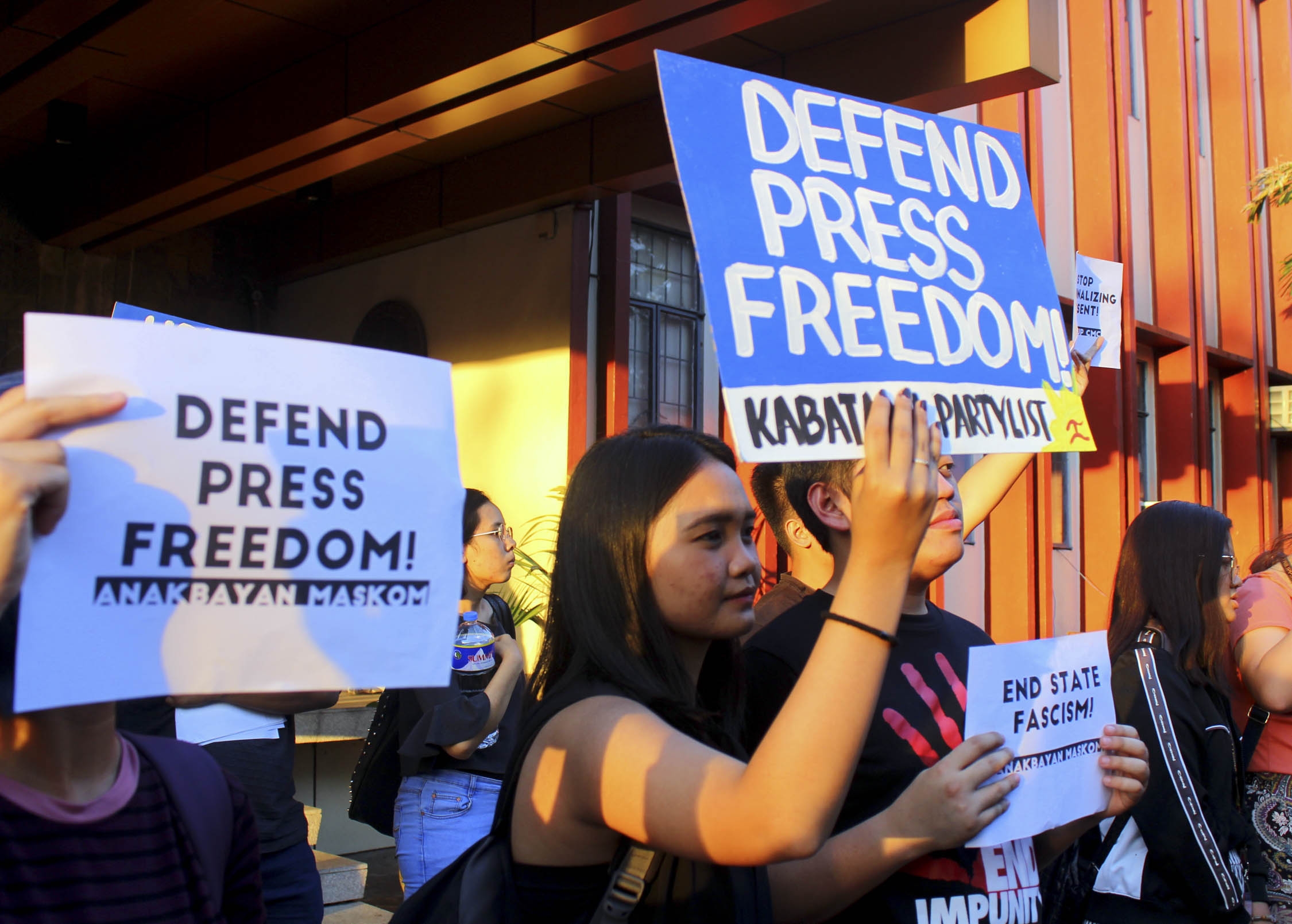Duterte: I don’t know about Ressa’s arrest

MALICIOUS TIMING Rappler CEO Maria Ressa accuses the government of weaponizing the cyberlibel law. —LYN RILLON
CITY OF SAN JOSE DEL MONTE, BULACAN — President Duterte has distanced himself from the cyberlibel case of Rappler CEO Maria Ressa that had led to her arrest, saying he had nothing to do with it.
The President on Thursday said he did not even know businessman Wilfredo Keng, who filed the complaint in the Department of Justice (DOJ) against Ressa and former Rappler researcher Reynaldo Santos Jr.
“I don’t know Keng. Frankly, I do not know him or what prompted him to file a case,” Duterte told reporters after rallying support here for 11 senatorial candidates he endorsed in May’s midterm elections.
“I really don’t know about [Ressa’s case and arrest]. Not for today. I was out [of my office] the whole day,” he added.
Duterte said he had yet to read reports about Ressa’s arrest at her Pasig City office late on Wednesday.
Article continues after this advertisement“Someone mentioned it on the stage but, same answer. I cannot give you an opinion or say anything,” he added.
Article continues after this advertisementRessa was ordered freed on P100,000 bail by the Manila Regional Trial Court on Thursday morning but only after spending Wednesday night at the National Bureau of Investigation.
She called the timing of her arrest “malicious.”
Lawyers’ inexperience
But Malacañang on Friday said Ressa should stop blaming the government for her lawyers’ inexperience in handling her cyberlibel case.
At a press briefing, presidential spokesperson Salvador Panelo dismissed Ressa’s claims that her rights were violated when she was arrested and that the government was “weaponizing” the law as a tool to harass journalists.
“Maria, you cannot blame the court nor the government nor this administration nor the President [for] the incompetence of your lawyer … So stop blaming anyone for the unpreparedness of your lawyers,” he said.
“You have to be woman enough to face the complaint against you,” he added.
Ressa’s lawyers, he said, failed to argue her entitlement to bail before a Pasay City court and to keep abreast of the case’s developments.
“My goodness, lawyers should always be on their toes. You know that your client is facing a charge and anytime the information could be filed,” Panelo said.
‘Ignorant’ supporters
Ressa’s arrest sparked outrage from local and international press freedom and human rights groups who saw it as a government attempt to silence critics of Duterte.
But Panelo said Ressa’s supporters, including CNN news anchor Christiane Amanpour and former US Secretary of State Madeleine Albright, were either “ignorant of the facts or misinformed of the facts.”
The report that spawned the libel complaint against Ressa included allegations in a Rappler report on May 29, 2012 that Keng was linked to illegal drugs, human trafficking and a murder case.
Keng denied the allegations.

FIGHT AGAINST INTIMIDATION Students and members of the faculty gather in front of the University of the Philippines College of Mass Communication building in Diliman, Quezon City, to fight for freedom of the press and protest against Wednesday’s arrest of Rappler CEO Maria Ressa. —JEMELLE DE LEON/CONTRIBUTOR
‘Mocked, attacked’
But top universities and their officials condemned Ressa’s arrest.
In a letter to the school community, Ateneo de Manila University president Fr. Jose Ramon Villarin SJ, said that freedom of speech and of the press, which “were once considered sacred, inviolable,” had now been “mocked, attacked, degraded.”
“It is journalists like [Ressa] who keep us all informed about the state of our nation,” Villarin said. “Too often these days, it is they who wage daily battles against fake news, expose corruption and bring to light illegal practices and wrongdoing by those who lead us.”
Bro. Armin Luistro, FSC, president of De La Salle Philippines, called on students and school officials to stand by Ressa and Rappler.
“Let’s give our support as Lasallians to Rappler. Let’s defend press freedom,” Luistro said. “Let’s make our voices heard.”
The University of the Philippines College of Mass Communication said Ressa’s arrest showed “a clear intent to harass and intimidate” the free press.
“In true martial law-era fashion, the arrest warrant was served after office hours, preventing the journalist from immediately filing bail,” it said.
The University of Santo Tomas Journalism Society expressed disbelief at the “questionable indictment.”
“The chilling message: This is what happens to journalists who do not toe the line,” it said. —WITH A REPORT FROM MATTHEW REYSIO-CRUZ AND AP